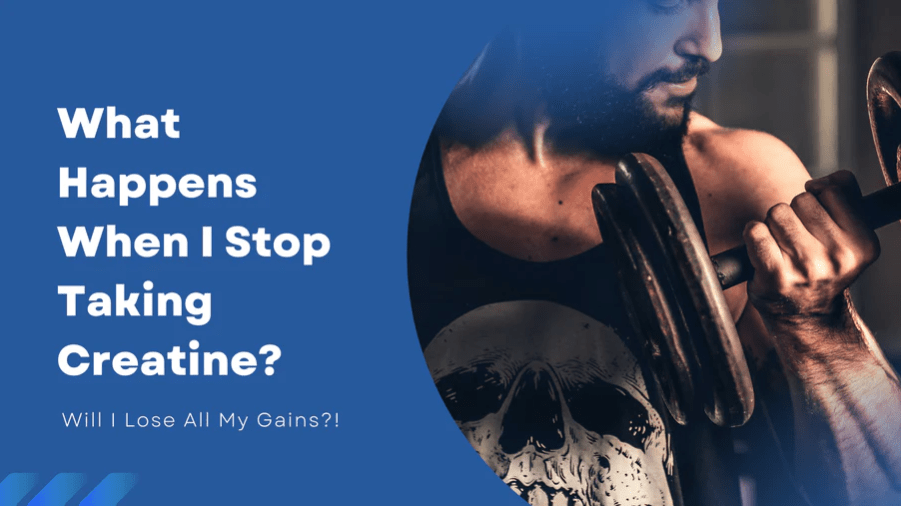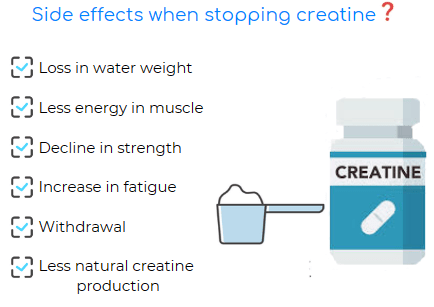What Happens When You Stop Taking Creatine?
What Happens When You Stop Taking Creatine? Your body will enter a 2-4-week time frame where it needs creatine. Then, at that point, your body will begin to deliver average creatine in the future.

At the point when you stop taking creatine, the most widely recognized aftereffects are:
- Decreased energy during exercises.
- Lower by and considerable strength
- More modest muscle appearance.
- Loss of water weight.
- Withdrawal side effects, including general exhaustion and loss of concentration.
- Lower regular creatine creation for 1 a month.
Yet again, side effects, for example, withdrawal and exhaustion, will blur as your body starts fabricating creatine normally. The adverse consequences on your athletic execution by halting the utilization of creatine enhancements will progressively standardize. Nonetheless, creatine supplements are demonstrated to increment execution. Without creatine, your maximized operation will be lower.
Table of Contents
| Is it Alright to Stop Creatine?
Is it a good idea for you to Stop Creatine? 5 Things That Happen When You Stop Taking Creatine Faster Fatigue During Exercises |
|---|
Is it Alright to Stop Creatine?
You won’t hurt your body any long-lasting by stopping your creatine supplement. Even though you will feel a few transient secondary effects, you are not in any clinical peril, assuming you quit taking Creatine. Thus, go ahead and stop whenever.
There is no risk of halting creatine supplementation.
You can stop Creatine whenever without risk.
Stopping Creatine will cause a few secondary effects.
Creatine withdrawal aftereffects will blur in 2 a month.
Keep in mind your body usually makes Creatine. When taking a creatine monohydrate supplement, regular creatine creation drops to deficient levels. It requires investment for your body to continue creatine creation. Within 2 a month after stopping Creatine, withdrawal side effects and impressions of weariness will blur.
Is it a good idea for you to Stop Creatine?
Creatine is the most secure enhancement available. Truth be told, studies have shown no connection between creatine supplementation and medical issues. Claims that creatine can cause kidney or liver harm seem unwarranted, as indicated by a few logical examinations. Thus, on the off chance that you’re taking creatine, you commonly don’t have to suspend the utilization of this enhancement.
Creatine is viewed as incredibly protected, so there is no excellent explanation for quitting taking it.
A few logical examinations have shown no connection between creatine supplementation and medical issues.
There is some association between creatine use and an expansion in the development of chemicals connected with going bald, yet this has not been profoundly considered.
In some cases, that creatine adds to going bald. One concentrate on the impacts of creatine found a relationship between creatine supplementation and an expansion in DHT levels. DHT is a chemical related to going bald. Nonetheless, further examinations have not shown a reasonable association between high creatine levels and going bald, so creatine is currently viewed as an exceptionally protected exercise supplement.
5 Things That Happen When You Stop Taking Creatine
If you’re taking creatine and considering stopping the enhancement, you can expect a couple of changes in the initial not many weeks in the wake of containing creatine. You’ll encounter this very thing when you quit creatine, as well as how long each incidental effect endures.
Faster Fatigue During Exercises
Creatine is put away in the muscles and advances the development of ATP, fuel for your muscles. In the initial few weeks after stopping creatine, you will become depleted significantly more rapidly during exercises. This is because your muscles don’t have creatine to draw upon for additional energy.
You will tire rapidly during exercises for the initial 2 a month after you quit creatine. As your body starts producing regular creatine, this depletion will steadily lessen. You will have more solid energy with creatine supplements during exercises.
When taking a creatine supplement, your body quits delivering creatine on the whole since you are getting all that could be needed from your enhancements. It requires half a month after you stopped enhancing with creatine before your regular creatine creation slopes up.
When you start delivering regular creatine once more, you will have better exercise perseverance. In any case, stable creatine creation won’t give you similar high energy levels you had when you were adding grams of creatine to your eating routine.
Decreased Strength
Creatine can increase strength by 8%. It can build your presentation by up to 20% during a power-preparing workout. When you quit taking creatine, you will enter an accident where your body is creatine-poor. At first, your exercise center presentation will be much lower without creatine.
Stopping creatine will cause a noticeable decline in strength for 2 a month.
As your body makes its own creatine once more, your solidarity will ascend back to typical levels.
Your solidarity pinnacle will be brought down without creatine supplementation.
Over a time of 2 a month — as your body starts standard creatine creation — your solidarity and execution will ascend back to typical levels. In any case, all-normal preparation won’t give as much creatine as supplementation. Indeed, even after your body makes average creatine, you will miss the mark on the 8% development support that creatine gives.
More modest Looking Muscles
When you quit taking creatine, your muscles will show up more modestly. This is because creatine urges your body to store more water in your muscles. This advances a “more full” look. Notwithstanding, stopping creatine will just objective your body to flush out water weight. It will help your slender bulk.
When you quit creatine, your muscles will look more modest. Creatine makes more water be put away in the muscles. Stopping creatine flushes out the water, which causes muscles to show up marginally more modestly. Halting creatine gives your muscles a more characterized appearance.
Loss of water weight is a highly durable result of stopping creatine. Some view this as a positive. Flushing overabundance of water from your muscles can prompt a more characterized, “cut” appearance. This way, stopping creatine can assist you with accomplishing specific body objectives.
Weight reduction
When you quit taking creatine, you will shed 5-7 pounds (23-3 kilos) of water weight. Creatine urges your body to store water in your muscles. When you stop creatine supplementation, that water weight will be flushed out, bringing about the speedy loss of a couple of pounds.
Halting creatine use will make you lose as much as 7 pounds (3 kilos) of putting away water.
Creatine urges the body to store water in the muscles — this water is flushed out when you quit creatine.
Stopping creatine can assist you with arriving at weight reduction objectives.
If you are preparing to hit a weight reduction target, stopping creatine can assist you with arriving at your objectives. This is useful if you are preparing to shoot a specific load for a wellness or battle sports rivalry. Along these lines, stopping creatine can have a few genuine advantages.
Withdrawal Side effects
General weariness and absence of center are typical results of stopping creatine. This is because a trim level of the creatine you take in using enhancements is put away in mind. An unexpected absence of creatine briefly moves your cerebrum science, prompting 2 months of mental weariness.
Stopping creatine can cause sensations of weariness and trouble centering. Weariness and exhaustion incidental effects slowly vanish more than 2 a month. Stopping creatine will only sometimes decrease your energy levels or capacity to center.
Fortunately, these weariness side effects will disseminate in half a month. After stopping creatine, you’ll feel such as yourself once more in a brief time frame. Thus, no long-lasting harm is done to energy levels when you supplement with creatine.
Will You Lose Muscle if You Stop Taking Creatine?
You will retain bulk when you quit taking creatine. All the muscles you acquired while working out with creatine will remain. Creatine helps water maintenance in the muscles, which makes them look better. This water will be flushed out once you quit creatine, yet you won’t really lose the good, strong muscle development you accomplished.
You won’t lose bulk by stopping creatine. Stopping creatine will flush an overabundance of water from your muscles, causing them to seem more modest. However, this isn’t a deficiency of muscle fiber.
You can utilize creatine to support your preparation for some time, then stop without losing your substantial advancement progress.
The advantages of creatine incorporate expanded strength and endurance, which can assist you with performing more challenging exercises and lifting more weight. This puts more weight on your muscles, setting off improved development. Since you will not lose muscle gain when you quit creatine, you can utilize this enhancement to help your exercise execution. Then, you can stop at that point with no serious, enduring aftereffects.

What Happens When You Stop Taking Creatine?
If you quit taking creatine, your body will enter a 2-4-week time frame where it needs creatine. Then, at that point, your body will begin to deliver average creatine in the future.
During this 2-multi week time frame, you will feel summed up weakness, speedy depletion during exercises, and decreased strength. Stopping creatine will reduce how much water is put away in your muscles, bringing about more modest, more characterized-looking powers.
The adverse secondary effects will blur as your body starts regular creatine creation. Creatine is a protected enhancement. You won’t be hurt by taking or stopping creatine.